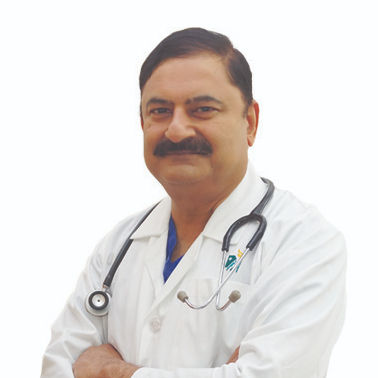Your Guide to the Dos and Don’ts of Living with an ICD
Learn the essential dos and don’ts of living with an ICD. Stay safe, manage your device effectively, and maintain a heart-healthy lifestyle with confidence.


Introduction: Thriving with Your Implantable Defender
Receiving an implantable cardioverter defibrillator (ICD) is a life-changing event. This remarkable device acts as a silent guardian, constantly monitoring your heart rhythm and ready to intervene if a dangerous arrhythmia occurs. While it provides immense security, living with an ICD comes with a new set of considerations. The key to not just living, but thriving with your device lies in understanding the essential dos and don'ts for living with an ICD. This guide is designed to empower you with practical knowledge, moving beyond simple rules to explain the reasons behind them. We will cover everything from daily interactions with technology to long-term health management and emotional well-being. By following these guidelines, you can confidently navigate your daily life, minimise risks, and maximise the protective benefits of your implantable defibrillator, ensuring it remains your trusted partner in health for years to come.
Understanding Your ICD: The Guardian of Your Heartbeat
Before diving into the specific dos and don'ts, it's helpful to understand what your ICD does. It's a small, battery-powered device implanted in your chest, connected to your heart via thin wires called leads.
How Does an ICD Actually Work?
Think of your ICD as a sophisticated computer that never sleeps. It continuously tracks your heart rate. If it detects a rhythm that is too slow (bradycardia), it functions as a pacemaker, sending tiny, painless electrical signals to pace your heart back to a normal rate. If it detects a dangerously fast rhythm (ventricular tachycardia or fibrillation), it first attempts to pace the heart out of it painlessly. If that fails, it will deliver a controlled electric shock to reset your heart's rhythm. This shock can feel like a sharp thump or kick in the chest.
Pacing vs. Shocking: The Two Modes of Protection
Understanding this dual function is crucial. The pacing function is subtle and constant, while the shock is a definitive treatment for a life-threatening event. Knowing this difference can help reduce anxiety; your device is working correctly whether you feel it or not.
Consult a Cardiologist for the best advice
The Essential Dos for a Healthy Life with an ICD
Proactive management is the best way to ensure your ICD serves you well. These are the positive actions you should integrate into your lifestyle.
Do: Carry Your ICD Identification Card
You will receive a card from your device manufacturer. Always carry this card with you. It contains vital information: the model, serial number, implant date, and your doctor's contact details. This is critical for any medical professional treating you in an emergency.
Do: Maintain Regular Follow-Up Appointments
Your ICD isn't a "set-it-and-forget-it" device. Regular check-ups, either in-person or through remote monitoring for your cardiac device, allow your doctor to:
- Check the battery life.
- Review the data logs of your heart rhythms.
- Ensure the leads are functioning properly.
- Adjust settings if necessary.
If you experience any unusual symptoms between check-ups, consult a doctor online with Apollo24|7 for a preliminary evaluation and to determine if an earlier appointment is needed.
Do: Adopt a Heart-Healthy Lifestyle
Your ICD treats arrhythmias, but it doesn't cure underlying heart disease. A healthy lifestyle is your first line of defence.
Diet and Nutrition
Follow a heart-healthy diet low in saturated fats, salt, and processed sugars. Focus on fruits, vegetables, whole grains, and lean proteins. Managing conditions like high blood pressure and diabetes reduces the strain on your heart.
Safe and Approved Physical Activity
Staying active is encouraged, but you must choose your activities wisely. Walking, swimming, and light cycling are generally excellent. Always discuss your safe exercise plan with an ICD with your cardiologist before starting any new workout regimen.
Do: Inform All Your Healthcare Providers
This includes your dentist, physiotherapist, and any specialist you see. Certain medical and dental procedures require special precautions to avoid interfering with your device.
Do: Monitor for Signs of Infection
Check the implantation site regularly for redness, swelling, warmth, drainage, or pain. A fever could also indicate an infection. Report any of these signs to your doctor immediately.
The Critical Don'ts: Protecting Your Device from Harm
The primary risks to your ICD come from electromagnetic interference (EMI), which can disrupt its normal function. These don'ts are centered on avoiding strong magnetic and electrical fields.
Don't: Underestimate Electromagnetic Interference (EMI)
When living with an ICD, it’s important to be aware of everyday sources of electromagnetic interference.
Household Appliances
Most standard household appliances are safe if in good working order. You can use microwaves, televisions, and computers without worry. However, maintain a distance of at least 6 inches (15 cm) from the motor of a running microwave. Be cautious with induction cooktops, as they generate strong magnetic fields; maintain a distance of at least 2 feet (60 cm).
Personal Electronics
- Cell Phones: It's safe to use a cell phone, but hold it to the ear opposite the side of your ICD implant. Don't carry the phone in a chest pocket directly over the device.
- Headphones: Small headphones contain magnets. Don't let them dangle on your chest or store them in a pocket over the ICD.
- Smartwatches/Fitness Trackers: These are generally safe, but avoid wearing them on the wrist closest to your ICD during activity, as the heart rate sensor uses light that could potentially be misinterpreted.
Security Systems and Theft-Deterrents
Walk normally through store security systems (anti-theft gates). Do not linger or lean against them. The magnetic field is brief and safe to pass through but can cause temporary interference if you stay within it.
Don't: Engage in Certain High-Impact Activities
Avoid activities that involve heavy impact to the chest area where the device is located. This includes contact sports like football, rugby, or martial arts, which could damage the device or dislodge the leads. Always get clearance from your doctor for any strenuous sport.
Don't: Delay Reporting a Shock or Device Alert
If your ICD delivers a shock, stay calm. Sit or lie down. If you feel well after one shock, call your doctor soon to report it. If you receive multiple shocks in a short period, or feel dizzy, chest pain, or unwell after a shock, call emergency services immediately. Similarly, if your device's alert system notifies you of an issue, contact your clinic promptly.
Navigating Medical and Dental Procedures Safely
Always inform any medical or dental professional about your ICD before a procedure. Some common treatments require special attention, such as:
- MRI Scans: Traditional MRI machines are generally not safe for most ICDs. However, many newer devices are "MRI-conditional." Your doctor will confirm if yours is safe and under what specific conditions.
- Diathermy: This heat-based therapy used in surgery or physiotherapy can be dangerous and is usually avoided.
- Electrocautery: Used in surgery to control bleeding, it may need to be programmed differently or used with caution.
- Lithotripsy (for kidney stones): Requires device reprogramming.
The Emotional Side: Addressing Anxiety and Fear
It's completely normal to feel anxious about your ICD, especially the fear of being shocked. This is known as "ICD shock anxiety." Talking to your doctor, a therapist, or joining a support group can be incredibly beneficial. Understanding that the shock is a life-saving event, not a sign of failure, can help reframe your perspective.
Conclusion
Living with an ICD is a journey of adaptation, but it is far from a limitation. By embracing the dos and don'ts for living with an ICD outlined in this guide, you take control of your health and safety. This device is a tool that grants you the freedom to live an active, fulfilling life with confidence. Remember, the rules are not meant to restrict you, but to protect you. Stay informed, communicate openly with your healthcare team, and prioritise your overall well-being. If you have specific concerns about your device or heart health, booking a consultation with a cardiologist through Apollo24|7 can provide personalised guidance and peace of mind.
Consult a Cardiologist for the best advice
Consult a Cardiologist for the best advice
Dr. Praveen Jaiswal
Cardiologist
17 Years • MD(Medicine), DM(Cardiology)
Indore
Apollo Hospitals Vijay Nagar, Indore

Dr. Dayanashre N
General Physician
3 Years • MBBS
Bengaluru
PRESTIGE SHANTHINIKETAN - SOCIETY CLINIC, Bengaluru

Dr. Bhethala Sharan Prakash
General Physician/ Internal Medicine Specialist
5 Years • MBBS MD
Bengaluru
PRESTIGE SHANTHINIKETAN - SOCIETY CLINIC, Bengaluru

Dr. Venkatesh T K
Cardiologist
10 Years • MBBS, MD (Med), DNB (Cardio)
Bengaluru
Apollo Hospitals Jayanagar, Bengaluru
(75+ Patients)

Dr. Abhishek Rathore
Cardiologist and Electrophysiologist
7 Years • MBBS, MD (Gen. Medicine), DM ( Cardiology ), Post-Doctoral Fellowship in Cardiac Electrophysiology.
Indore
Apollo Hospitals Vijay Nagar, Indore
Consult a Cardiologist for the best advice
Dr. Praveen Jaiswal
Cardiologist
17 Years • MD(Medicine), DM(Cardiology)
Indore
Apollo Hospitals Vijay Nagar, Indore

Dr. Dayanashre N
General Physician
3 Years • MBBS
Bengaluru
PRESTIGE SHANTHINIKETAN - SOCIETY CLINIC, Bengaluru

Dr. Bhethala Sharan Prakash
General Physician/ Internal Medicine Specialist
5 Years • MBBS MD
Bengaluru
PRESTIGE SHANTHINIKETAN - SOCIETY CLINIC, Bengaluru

Dr. Venkatesh T K
Cardiologist
10 Years • MBBS, MD (Med), DNB (Cardio)
Bengaluru
Apollo Hospitals Jayanagar, Bengaluru
(75+ Patients)

Dr. Abhishek Rathore
Cardiologist and Electrophysiologist
7 Years • MBBS, MD (Gen. Medicine), DM ( Cardiology ), Post-Doctoral Fellowship in Cardiac Electrophysiology.
Indore
Apollo Hospitals Vijay Nagar, Indore
Frequently Asked Questions
Can I travel with an ICD?
Yes, you can travel. Inform airport security about your device—you should not go through the full-body scanner. Request a pat-down instead. Keep your ICD ID card handy. Carry a list of your medications and your doctor's contact information.
How long does an ICD battery last?
Typically, an ICD battery lasts between 5 to 10 years, depending on how often it paces or delivers shocks. Your doctor will monitor the battery level during check-ups and schedule a replacement surgery before it runs out.
What does it feel like when an ICD shocks you?
The experience varies. Some describe it as a sudden, sharp thump or a kick in the chest. The shock is very quick. If you are unconscious when it happens, you may not feel it at all. If you are awake, it can be startling but is over in an instant.
Are there driving restrictions after getting an ICD?
Yes, there are usually temporary driving restrictions after implantation or after a shock event. This is for your safety and the safety of others. The specific duration varies by country and your individual medical condition. Your doctor will provide clear guidelines.
Is it safe to use an electric blanket or heating pad?
Most electric blankets and heating pads are safe if they are in good condition. However, do not place the heating pad directly over the ICD device itself, and avoid falling asleep with a high-heat setting on.